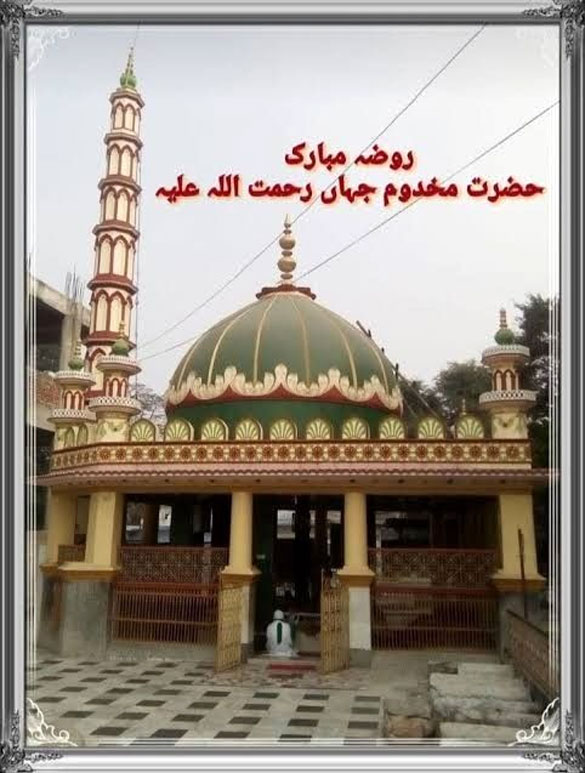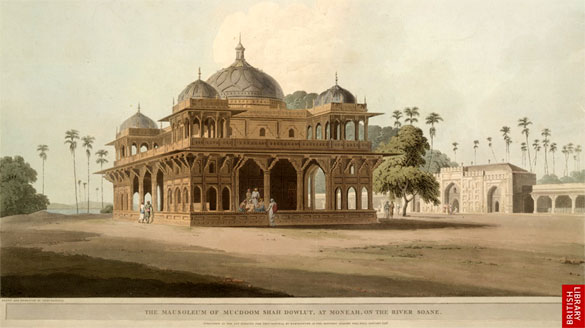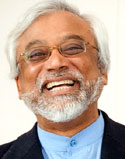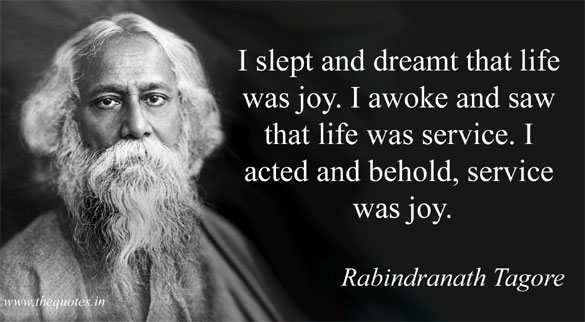
By Arman Neyazi, New Age Islam
31 May 2021
Makhdoom Sharfuddin Ahmed bin Yahya Maneri, Popularly Known As Makhdoom-ul-Mulk Bihari and Makhdoom-e-Jahan Was A True Epitome Of Pluralism in Tasawwuf
Main Points:
1. Muslim Sufis of India are much revered all over the world for their teachings of humane traits.
2. Indian Muslim Sufis teachings and practices were directed to advocating a pluralistic approach towards society.
3. Indian social ethos is celebrated all over the world in the background of the works of Indian Sufis.
4. Indian social ethos of ‘unity in diversity is celebrated all over the world in the background of the works of Indian Sufis.
-------
Muslim Sufis of India are much revered all over the world for their teachings of humane traits. People of conscience accept, study and practice their teachings in their work of advocating a pluralistic approach towards society. Indian social ethos of ‘unity in diversity is celebrated all over the world in the background of the works of Indian Sufis.
India is a country that boasts of Sufis and Rishi Muni in almost every of its state. Their centuries-old teachings of compassion, equality and brotherhood reverberate in nook and corner of the country in various national and regional languages.
Spiritual masters are devoted to love. Sufi masters are spiritual masters who devote their lives seeking the Creator’s compassion and forgiveness for the people and the nation as a whole. They dedicate their lives to the welfare of society. Many of them live such a penurious life that only people of vision understand what they are. Kings and warriors visit their Dargah and or earthen cabins (कुटिया کٹیا) whatever be the situation for their blessings and Ashirwad.

Dargah Hazrat Sharfuddin Ahmad Yahya Maneri(رحمة الله عليه )
----
Makhdoom Sharfuddin Ahmed Yahya Maneri (رحمة الله عليه ) was one of those revered Muslim Sufis who are followed by both Hindus and Muslims, alike. Hazrat Maneri (RA) was a scholarly Sufi. He knew Arabic, Persian, logic, philosophy and along with religion, he had mastered the soul of Tasawwuf (Sufism) through his self created seclusion from the world during his 30 years of meditation in the jungles of Bihar. To know his spiritual power, consider his following uplifting quotations:
1. Sin is the key to misery.
2. The existence of lover in the pavilion of the Beloved is a sin beyond comparison to any other.
3. O Brother! Sin for the servant is great calamity. May God protect us from such things! Sin in the beginning hardens the heart, which ultimately leads to unbelief and wretchedness. Don't forget the wiles of Satan and the fate of Balāam Bāōur.
4. Spiritual Guide should be perfect, well versed in the vicissitude of the mystic path, and firmly established in his high state. He should be a man who has experiences both the horror of God's Majesty and the delight of His beauty.
5. Mystic way is infested with one's ego, devils, men and Jinn, thus making it impossible to travel along it without and experienced, holy man as one's escort. Also there are many slippery places where it is easy to fall. And one can be plagued with misfortune and dangers from behind.
6. O Brother! There are thousands upon thousands who have been martyred and slain on the Divine way. Many other thousands are wounded and thrown prostrate. Those well known for their intellect have been perplexed in their search for Him and those famous for their religious knowledge are searching Him at the outskirts of His Glory and Tremulousness. Those, whose eyes and radiant and heart clairvoyant, are submerged in one drop of His ocean of His Majesty or singed like sparks from the fire of His Glory.
7. Bliss and misery are two treasures of the Lord. The key to the former is submission, while the key to the latter is sin. The one who is fortunate has been blessed from his mother's womb. Such a person is given the key to bliss. The one who is unfortunate has been born accursed. Sin is the key to misery.
8. O Dear! Live in this world broken-hearted and miserable. When Moses asked God: "O Lord where should I search You?" The answer came: "In the heart which is broken by the hand of destiny."
Courtesy: The Sayings and Teachings of the Great Mystics of Islam, Gujranwala, Pakistan, 2004) (By Muhammad Riaz Qadiri)
Hazrat Maneri (RA) has taught the world that Sufism is not a lesson to be learnt but practised with the knowledge that Allah is All-Knower and the only ultimate guide of the seekers of knowledge. It is ingrained in the soul and spirit of the individual that gets enriched in the company of noble souls and holy books. Sufism is a service, first to the spiritual teachers and then to the people. Sufis are holy souls that are close to Allah, the Creator of this universe. The closeness of Allah is subject to our service to His creation. Allah has ingrained compassion, love and brotherhood in His creation therefore those who abide by His commands are close to Him.
Yahya Maneri (RA)’s Childhood and Education
Makhdoom Sharfuddin Ahmed bin Yahya Maneri, popularly known as Makhdoom-ul-Mulk Bihari and Makhdoom-e-Jahan was born to an illustrious father Makhdoom Kamaluddin Yahya Maneri bin Israel bin Taj Faqeeh. His father was known as Sheikh Al-Hind. Yahya Maneri (RA)’s lineage goes back to a place called Al-Khaleel. Al-Khaleel is connected to Prophet Hazrat Ibrahim (AS) who is supposed to be resting there in his heavenly abode. Al-Khalil is in Syria about 24 Kilometres from Jerusalem.
Yahya Maneri (RA left his native place Maner near Patna in Bihar, India in search of traditional knowledge of Arabic, Persian, logic, philosophy and religion at the tender age of 12. He received his initial education at Narainganj, now in Dhaka, Bangladesh for twenty-four years. He was imparted knowledge by a famous scholar of his time, Ashraf-Uddin Abu Towama Bukhari.
After the completion of his education at Narainganj, Yahya Maneri (RA) left for Delhi in search of his spiritual education and training. At that time Delhi was known for the most revered of all the Sufis there, Hazrat Nizamuddin Aulia (RA) along with many other Sufis.
Hazrat Maulana Syed Abul Hassan Ali Nadwi has dedicated on full chapter to Hazrat Yahya Maneri (RA) in his famous book ‘Tareekh Dawat o Azeemat ‘ Vol II (Saviours of Islamic Spirit Vol. II). Maulana Syed Abul Hassan Ali Nadwi writes about Hazrat Yahya Maneri (RA)’s journey to Delhi and his being a disciple of Hazrat Khwaja Najeebuddin Firdausi as under:
Ahmad Sharfuddin came back disheartened from Delhi and Panipat. His elder brother Shaikh Jalaluddin, however, suggested him to see Hazrat Khwaja Najeebuddin Firdausi and told him about the distinctive features of his order. Ahmad replied: ” The one who is the Pivot of spiritual perfection at Delhi ( meaning Hazrat Khwaja Nizamuddin Auliya) sent me back with a tray of beetles. What shall I gain by meeting others ?” but, on the insistence of his brother, he made up his mind to betake himself to Delhi once more. As he related, later on, he found himself in a flutter, and profusely perspiring when he got near Hazrat Khwaja Najeebuddin Firdausi. He says that he had never had a similar experience earlier on meeting any other mystic.
As soon as Hazrat Khwaja Firdausi saw Ahmad, he said: ” Chewing beetles and carrying beetle leaves in your handkerchief you come to see me, and still, you presume yourself to be a spiritual guide! ” Ahmed emitted the beetle he was chewing and sat down bewildered as if suddenly awakened to an unthought-of truth. After a while, he requested Hazrat Khwaja Najeebuddin to accept him under his spiritual preceptorship. The Khwaja graciously agreed to his request but sent him back after taking the Ba’it from him.
Hazrat Maneri (RA)’s Spiritual Journey
Born in July 1263 A.D. (29 Sha'aban 661 A.H.) Sheikh Sharfuddin Ahmed bin Yahya Maneri (RA) spent thirty years in meditation in the forests of Bihiya, about 24 kilometres and Rajgir, about 120 Kilometres from Maner. During his stay in the jungle of Rajgir, he performed ascetic exercises in the hills that kept him aloof from society. There is a spring of hot water in Rajgir that is named after him as ‘Makhdoom Kund’. It is said that he used to pray at a nearby place close to that spring.
After spending 30 years of a secluded life away from the material comfort of the world in quest of closeness to His creator, Sheikh Sharfuddin Ahmed bin Yahya Maneri (RA) settled at Bihar Sharif, about 24 Kilometres west of Maner. At the Khanqah at Bihar Sharif, he preached compassion, love, humanity and brotherhood through his sermons and taught and trained his disciples in Sufism. His life after that was dedicated to teaching and writing.
The collections of the hundred letters he wrote to his disciple, Qazi Shamshuddin in 747 Hijra, Maktoobat e Sadi (Hundred Letters Of Century) and Maktoobat e Do Sadi (Two Hundred Letters Of Second Century) based on Islamic Theosophy are literary genii on spiritual writing. Original manuscripts of his books on Sufism, Rahat-ul-Qulub, Kanzul-Ma-Ani, Favaedat Rukni, Shara-e-Abadul راحت القلوب، کنزول ما عینی ، فوائدت رکن، شارع عبادل) are counted as remarkable works of Tasawwuf are available in the collection of Khuda Bakhsh Oriental Library at Patna, Bihar India.
He kept writing and delivering sermons for up to 52 years from his Khanqah at Bihar Sharif that was built by Sultan Muhammad Tughlaq, before he left for his heavenly abode in January 1381 A.D.(6 Shawwal 782 Hijri).
Makhdoom Sharfuddin Ahmed bin Yahya Maneri (RA), popularly known as Makhdoom-ul-Mulk Bihari and Makhdoom-e-Jahan was a true epitome of his name ‘Makhdoom’, means ‘one who serves. He served humanity with all his might and ability, both spiritual and physical. People over the world are still in contact with him through his writings that are taken as a guiding light in the world of Tasawwuf (Spiritualism).

Choti Dargah, Mausoleum of Makhdoom Shah Daulat, descendant of Makhdoom Yahya Maneri at Maner, 1780s painting
----
And Allah knows the best.
----
Arman Neyazi is a columnist with NewAgeIslam.com.
URL: https://www.newageislam.com/islamic-personalities/khwaja-yahya-maneri-spiritual-idea-india/d/124907
New Age Islam, Islam Online, Islamic Website, African Muslim News, Arab World News, South Asia News, Indian Muslim News, World Muslim News, Women in Islam, Islamic Feminism, Arab Women, Women In Arab, Islamophobia in America, Muslim Women in West, Islam Women and Feminism











 Moderate Islamist here
Moderate Islamist here





